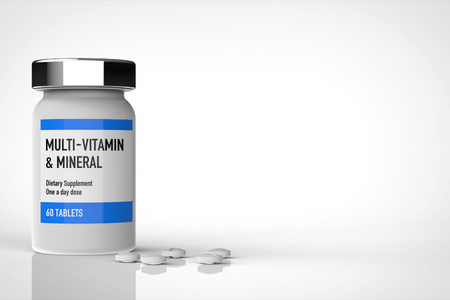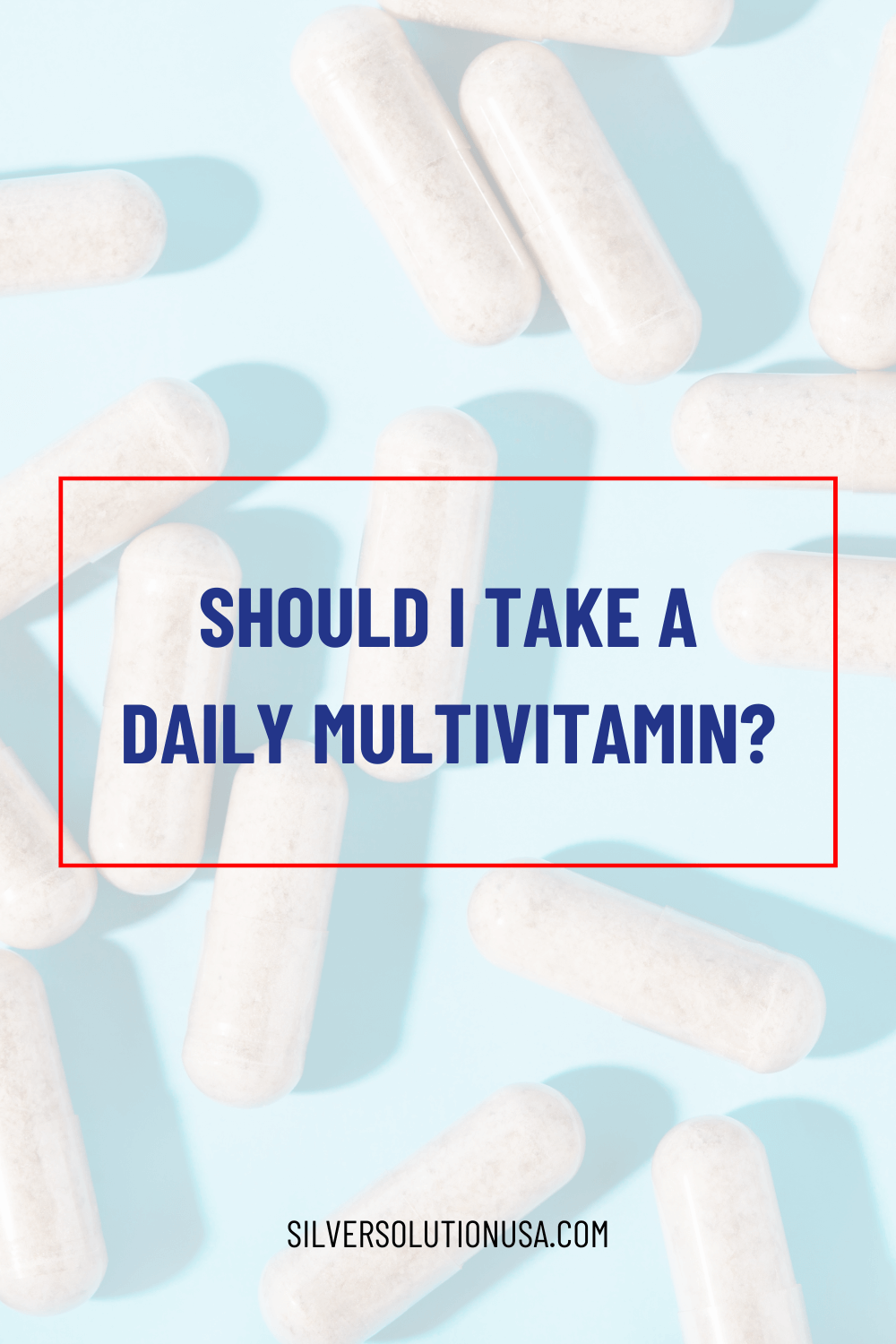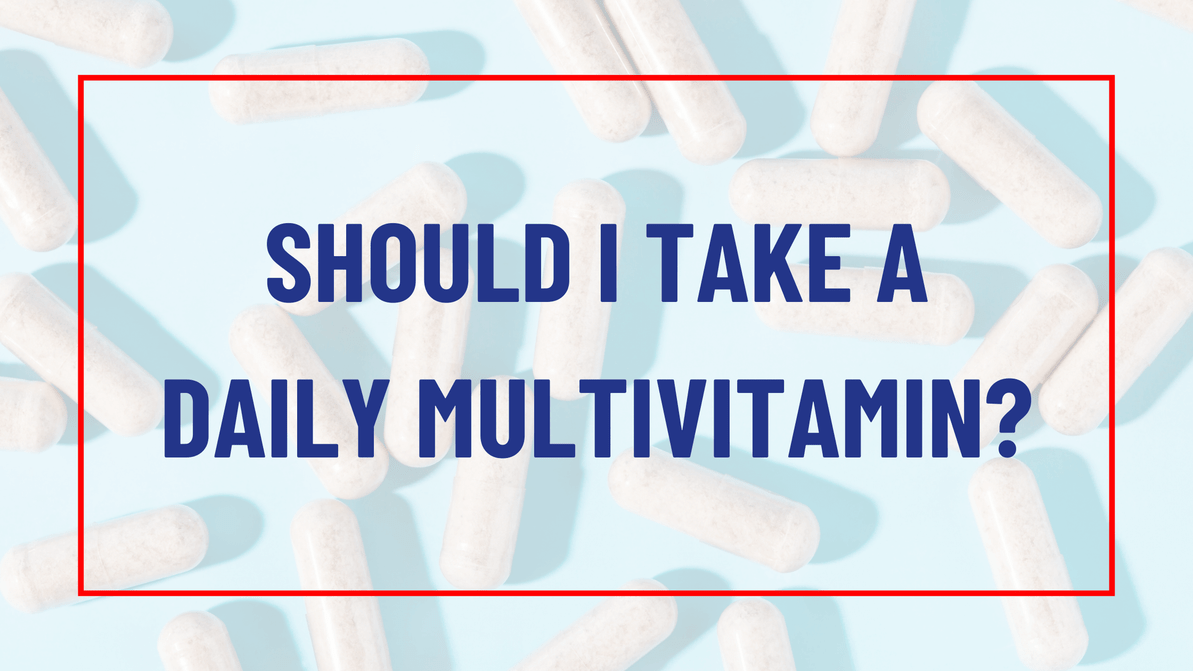Should I Take a Daily Multivitamin?
The world of supplements is vast, and if you’re like most people, a bit confusing and intimidating to sort through all of the information. With approximately 29,000 supplements on the market today (just in the US) and around 1,000 more added to the mix annually (also just in the US), you’d hardly be to blame. [According to the FDA]
Whether you’ve been taking supplements for years “just because” or are asking yourself whether you should be, follow our Supplement Series for an overview of the whats, whys, and whos of individual supplements. (And please read our disclaimer at the end of this post.)
Multivitamins, along with minerals, are the most popular supplements available. They’re said to boost your immunity, your energy, and your general well-being.
Some swear by daily multivitamins. Others prefer to take them occasionally.
The truth is multivitamins can’t make up for poor eating habits in the long run. But they have many benefits and, when taken correctly, can improve your health significantly.
If you’re wondering:
- Should I take a daily multivitamin?
- Is it really as great for my health as they say?
- Who are they best for?
- Do they have any side effects?
Then this article is for you.

What are multivitamins?
Multivitamins are supplements that contain various vitamins and minerals.
Their exact composition varies from brand to brand. There is no standard to define what a supplement should contain to be deemed a “multivitamin.” That’s why the exact composition may differ slightly from brand to brand.
They come in different forms:
- Gummies
- Tablets
- Liquids
- Powders
But there is no best form.
Gummies are usually formulated with children in mind. They’re chewable and come in various flavors. A word of caution: gummies sometimes contain added sugars or other chemicals to give them those lovely flavors. You might want to double-check the label before using them.
Liquids and powders are great because they can often be mixed into drinks or smoothies. Plus, they’re easily processed by the body.
Tablets are the most common form. Along with gummies, tablets are the easiest to use when traveling or in a hurry.
What do they contain?
The FDA does not regulate dietary supplements as strictly as prescription drugs. As a result, the exact composition of multivitamins differs from manufacturer to manufacturer.
Some may contain more of certain vitamins and fewer of others. Some include precisely the maximum recommended dose of each vitamin, and so on. They might have minerals, or they might skip them altogether.
There are also daily vitamins that contain other nutrients, such as spirulina, green tea extract, omega-3, and more.

Which multivitamins should I choose?
The answer depends on several factors.
- Are you looking to boost your immunity?
- Have more energy?
- Are you going through a challenging time and need a little boost?
- Do you have a deficiency?
All this can guide you in choosing the correct products for your body.
Most products marketed as daily multivitamins are meant to be taken 1-3 times daily. That means their composition is safe for most people when used in the recommended doses.
But that doesn’t mean they can’t have side effects. Some supplements can also contain additional ingredients that may interact with other medications. If in doubt, be sure to check with your physician or a pharmacist. 
Should I take a daily multivitamin?
We all need vitamins. But that doesn’t mean we all need to supplement. Often, a healthy, balanced diet is enough to give you all the vitamins and minerals your body needs. However, there are categories for whom supplementation can be a lifesaver.
For instance, older adults may need more vitamin D and calcium. B12 absorption also decreases with age. So no matter how varied your diet is, you might find your body deficient in certain vitamins or minerals. In this case, supplementation can come to the rescue.
Vegans and vegetarians could also benefit from a daily multivitamin. Many of these diets are low in vitamins B12 and D, iron, zinc, and omega-3 fatty acids.
Women who are trying to get pregnant could also find supplementation helpful. However, talk to a doctor before taking supplements at this stage to make sure you’re not sabotaging yourself.
People on low-calorie diets or those who have undergone weight loss surgeries will also benefit from a daily multivitamin. These diets rarely meet the requirements in terms of nutrients, so a boost is needed.
There are other instances when a multivitamin is very helpful. A few examples include:
- When you’re traveling
- When you’re going through a challenging period and not getting enough nutrients (perhaps eating a lot of junk food or even skipping meals)
- When you’re recovering after an illness that left you feeling weak and depleted*
*(In this case, however, be sure your doctor approves of your supplement. This is especially important if you’re still taking medications.)
Remember, daily multivitamins are not a substitute for a healthy lifestyle. It can help you for a short period. But long term, it’s best not to count on a multivitamin all the time unless your doctor recommends otherwise.
Even if you choose to take one, prioritize eating a balanced diet that gives you all the necessary vitamins and minerals.

Benefits of multivitamins
Multivitamins have many benefits, including boosting your energy and immunity. And research shows there may be other positive effects.
For instance, several studies showed multivitamins could improve memory and brain function in older adults. This could be because your body’s ability to process vitamins and minerals decreases with age. Helping it with a daily multivitamin could help slow the natural cognitive decline.
Nutrient deficiencies are sometimes the root cause of disorders such as anxiety and depression. It’s no surprise that some studies found multivitamins to improve mood. Zinc, for example, is seen by many as a natural antidepressant.
Multivitamins could also help improve eye health. As we age, our eyesight often worsens. The antioxidants in these supplements could help slow down this process and even reduce the risk of cataracts.
There’s also research on multivitamins and cancer, but the results are mixed. Some say supplementing with a daily multivitamin can reduce your risk of cancer. A 1998 study showed a reduced incidence of colon cancer in those taking multivitamins and folate.
Some studies find no link between vitamins and cancer.
Last but not least, multivitamins may improve heart health. Some studies showed a reduced risk of heart disease in those using a supplement with vitamins and minerals. Others find no link between the two.
Research shows that men and women may react differently to supplementation. For instance, a 2012 randomized controlled trial showed no improvement in cardiovascular health in men taking multivitamins.
A study conducted in 2015 on women showed a lower risk of heart disease after 3 years of using a multivitamin and mineral supplement.
Overall, there is mixed evidence about the benefits of multivitamins. Many people will see some improvement from using them. Others may notice no changes.

Possible side effects
Are multivitamins safe? Generally, yes, but there are precautions.
The most common side effects you might experience are digestive ones. These include an upset stomach, constipation, diarrhea, and nausea.
These issues should be minor and shouldn’t disrupt your day-to-day activities. They usually subside after a few days. If they don’t go away or become more serious, consider stopping the supplement and seeing a doctor.
Insomnia, headaches, and even nosebleeds are rare side effects, but they’re possible nonetheless. They’re more common when you take very high doses of vitamins that exceed the daily upper safe limit.
If this happens, stop the supplement and look at your diet. You may already be getting plenty of vitamins from your foods, and you don’t need a multivitamin.
Allergic reactions are also possible, though rare. So if you just started a new supplement and experience hives, difficulty breathing, swollen face, and more, see a doctor and make sure you stop taking the vitamins.

The bottom line
Multivitamins are supplements containing various vitamins and minerals. There’s no standard composition as they’re not strictly regulated by the FDA, so different brands will have different multivitamins. They could also have extra ingredients, such as omega-3, spirulina, and more.
If you’re wondering, “should I take a daily multivitamin?” the answer is—it’s not necessary. Contrary to what some state, multivitamins don’t replace a healthy lifestyle long term.
They’re great for a short period when you just can’t eat as healthily as you would like, such as when traveling. But in the long run, prioritize getting your nutrients from food.
That being said, some people will benefit from a daily vitamin more than others. Examples include older adults, people on low-calorie diets, and even those going through a very stressful period.
Multivitamins have many benefits. They can increase your energy and boost your immunity and your mood. They may even improve your eyesight and heart health.
If you’re looking for a safe multivitamin that you can take every day, check out our Multivitamin Packs. They’re especially great if you travel and want an easy way to take just a few servings without carrying around the entire bottle.
And if you’re looking for a vegan vitamin and mineral complex, our Vegan Complete Multi-Vitamin & Mineral Complex is made just for you.

Health/Medical Disclaimer
This blog post does not provide health or medical advice. This blog post is for informational and educational purposes only and is not a substitute for professional health or medical advice. Before taking any actions based upon such information, we encourage you to consult with the appropriate medical and healthcare professionals. We do not provide any kind of health or medical advice. The use or reliance of any information contained on this blog is solely at your own risk.
Sources
https://ods.od.nih.gov/factsheets/MVMS-Consumer/
https://pubmed.ncbi.nlm.nih.gov/22939764/
https://pubmed.ncbi.nlm.nih.gov/20110592/
https://pubmed.ncbi.nlm.nih.gov/16491668/
https://pubmed.ncbi.nlm.nih.gov/22095836/
https://jamanetwork.com/journals/jamaophthalmology/fullarticle/413838
https://pubmed.ncbi.nlm.nih.gov/9758570/
https://pubmed.ncbi.nlm.nih.gov/21343248/
https://pubmed.ncbi.nlm.nih.gov/23117775/
Recent Posts
-
Are sunscreen ingredients harmful?
Sunny days can bring a lot of fun. Going out for a swim, spending time in nature, or relaxing on the …18th Mar 2024 -
The Veggie Debate: Does Cooking Vegetables Destroy Nutrients and the Best Ways to Cook Them
Vegetables are one of the healthiest foods you can choose. Some people downright hate them, while so …4th Mar 2024 -
Best Foods for COVID Recovery and Prevention
A few years ago, a new virus took the world by surprise. COVID-19 may look like the flu on the surfa …19th Feb 2024




